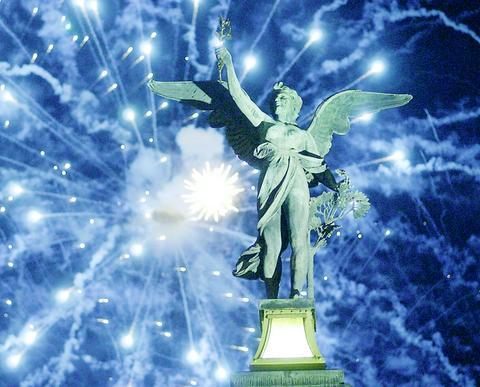With a blaze of fireworks and street celebrations, the EU threw open its gates to 10 new members yesterday, reuniting a continent scarred by decades of Cold War conflict.
Hundreds of thousands thronged open-air parties, concerts and border ceremonies from the Atlantic to the Baltic and the Mediterranean as political leaders hailed the final closing of Europe's east-west divide, 15 years after the Berlin Wall fell.

PHOTO: EPA
Star-studded blue EU flags were hoisted in eight central and eastern European states that endured decades of Soviet-dominated communist rule, and on the Mediterranean islands of Cyprus and Malta, which join the wealthy 15-nation west European bloc.
"Ladies and gentlemen, we are making history ... Today our dream is becoming reality. Poland is returning to its European family," President Aleksander Kwasniewski told crowds in central Warsaw at a midnight flag-raising ceremony.
But a group of Polish Euro-sceptics heckled him. And in Prague, Czech President Vaclav Klaus, a longtime EU critic, gave a sour television address, saying Czechs would have to master Brussels' bureaucratic ways while preserving their identity.
More than 100,000 revellers thronged central Budapest, feting their return from the cold with fireworks, music and champagne, and Prime Minister Peter Medgyessy declared that "Hungary has returned to Europe ... It has deserved it, 10 million people have worked for it."
Crowds of tens of thousands rejoiced in Prague and Vilnius.
Leaders of the new 25-nation bloc, representing 450 million citizens, held a ceremonial summit in Dublin later yesterday to mark the birth of the world's biggest trading bloc, rivalling the US.
For East Europeans in Poland, the Czech Republic, Slovakia, Hungary, Slovenia, Estonia, Latvia and Lithuania, enlargement crowns 15 years of often painful economic reforms since the collapse of communist rule.
In Brussels, headquarters of the EU, ambassadors of the 10 newcomers attended an emotional ceremony in the historic Grand' Place in which a spotlight picked out their flags one by one on the balcony of city hall as some 3,000 revellers cheered.
"We are all Europeans now," an announcer declared.
One of the fathers of European reunification, a tearful former German Chancellor Helmut Kohl, told thousands at a ceremony in Zittau on the German-Czech-Polish border: "The message is there will never again be war in Europe."
Rejoicing was more muted in Cyprus after split referendums last Saturday meant the Greek Cypriot south of the island joins the EU despite rejecting a UN peace plan, while the Turkish Cypriot north remains outside it despite voting "yes."
Also See Story:
US asleep as EU expands its membership eastward

AIR SUPPORT: The Ministry of National Defense thanked the US for the delivery, adding that it was an indicator of the White House’s commitment to the Taiwan Relations Act Deputy Minister of National Defense Po Horng-huei (柏鴻輝) and Representative to the US Alexander Yui on Friday attended a delivery ceremony for the first of Taiwan’s long-awaited 66 F-16C/D Block 70 jets at a Lockheed Martin Corp factory in Greenville, South Carolina. “We are so proud to be the global home of the F-16 and to support Taiwan’s air defense capabilities,” US Representative William Timmons wrote on X, alongside a photograph of Taiwanese and US officials at the event. The F-16C/D Block 70 jets Taiwan ordered have the same capabilities as aircraft that had been upgraded to F-16Vs. The batch of Lockheed Martin

GRIDLOCK: The National Fire Agency’s Special Search and Rescue team is on standby to travel to the countries to help out with the rescue effort A powerful earthquake rocked Myanmar and neighboring Thailand yesterday, killing at least three people in Bangkok and burying dozens when a high-rise building under construction collapsed. Footage shared on social media from Myanmar’s second-largest city showed widespread destruction, raising fears that many were trapped under the rubble or killed. The magnitude 7.7 earthquake, with an epicenter near Mandalay in Myanmar, struck at midday and was followed by a strong magnitude 6.4 aftershock. The extent of death, injury and destruction — especially in Myanmar, which is embroiled in a civil war and where information is tightly controlled at the best of times —

Taiwan was ranked the fourth-safest country in the world with a score of 82.9, trailing only Andorra, the United Arab Emirates and Qatar in Numbeo’s Safety Index by Country report. Taiwan’s score improved by 0.1 points compared with last year’s mid-year report, which had Taiwan fourth with a score of 82.8. However, both scores were lower than in last year’s first review, when Taiwan scored 83.3, and are a long way from when Taiwan was named the second-safest country in the world in 2021, scoring 84.8. Taiwan ranked higher than Singapore in ninth with a score of 77.4 and Japan in 10th with

SECURITY RISK: If there is a conflict between China and Taiwan, ‘there would likely be significant consequences to global economic and security interests,’ it said China remains the top military and cyber threat to the US and continues to make progress on capabilities to seize Taiwan, a report by US intelligence agencies said on Tuesday. The report provides an overview of the “collective insights” of top US intelligence agencies about the security threats to the US posed by foreign nations and criminal organizations. In its Annual Threat Assessment, the agencies divided threats facing the US into two broad categories, “nonstate transnational criminals and terrorists” and “major state actors,” with China, Russia, Iran and North Korea named. Of those countries, “China presents the most comprehensive and robust military threat